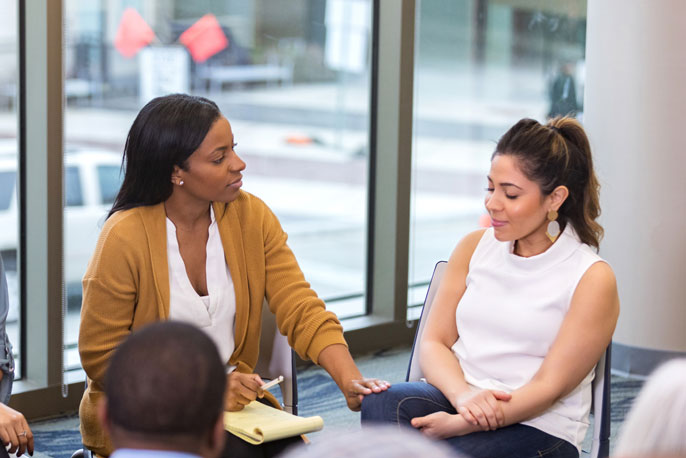
Does social media make you happier … or more frustrated?
Once supposed to help us strengthen our bonds and create new connections, social media now seems just as associated with bullying, burnout and endless conflict. In some cases, it may actually be hurting our ability to feel for each other.
That’s according to Emiliana Simon-Thomas, science director at UC Berkeley’s Greater Good Science Center. Fortunately, she is an expert on an age-old tool she says can help us inject some actual connection into the online world — empathy.

Credit: UC Berkeley Greater Good Science Center
Empathy is our ability to sense the emotions of others and understand what they’re feeling and why. It’s a mechanism that can help us come together in life’s most dramatic moments — like natural disasters or personal loss — and also improve more mundane situations like scrolling through Twitter.
Too much screen time and not enough face-to-face communication gives us fewer chances to practice empathy, Simon-Thomas says. As a result, people get worse at “reading” each other’s emotional expressions. When we can’t read each other to begin with, we erode our ability to connect, and our overall health and well-being.
But social media doesn’t have to be all bad — we can reclaim it from negativity and use it wisely — in ways that strengthen our connections with others. Here are her tips for nurturing empathy so that social media does not diminish your happiness.
Prioritize eye contact
If a person is so absorbed in social media on their phone/screens/devices that they do not make eye contact with other people around them, they will become less empathetic for two reasons:
- They won't see what other people are signaling to begin with; and
- They become less skilled at “reading” other people's emotional expressions when they do happen to see them.
When communication is relegated to devices, people also get worse at detecting emotions that are communicated by tone of voice, or through touch. So make a point to stay empathically sharp by prioritizing face-to-face interactions in daily life. Also, as you browse and post on social media, keep in mind that posts inherently lack what is automatically communicated face-to-face, which means you might have to adopt a more curious (e.g., I am not sure I understand — could you say more?) and emotionally candid (e.g., My brows are furrowed in confusion) style of communicating.
Avoid comparing yourself to others
Do you scroll through your Instagram feed with alternating feelings of jealousy or conceit? Consuming content through a social comparison lens is a sure way to put your empathy at risk. When people see themselves as different from those they view on social media, either in status or political orientation or another identity-related thing, they become less empathetic towards them, Simon-Thomas says.
Use social media to foster connections
People can engage with phones/screens/devices in a balanced way that acknowledges it’s not always possible to see someone face-to-face.
- Use videoconference features to catch up with remote friends and family.
- Post messages of support that align with your sense of purpose or that foster meaningful connections with your community.
- Use social media to learn about people from faraway parts of the world.
- Try to avoid a siloed, “different-from-you” perspective when you’re on social media and work to develop a more humanistic, inclusive perspective that helps you understand people from different backgrounds.
Try empathy during online conflicts
Before you righteously lash out, take a deep, full breath and exhale slowly. The problem with interpersonal conflict is that we feel threatened, angry and defensive, and these feelings shift thinking in ways that are rarely conducive to empathy.
- Fear magnifies our urge to freeze, withdraw or escape,
- Anger puts the attentional spotlight on finding someone to blame, and
- Defensiveness directs thoughts to focus on the self.
While these emotions appropriately equip us to handle more serious, even life-threatening circumstances than we typically face, they are often overkill for online disputes. Knowing that, you can try to calm self-serving urges by taking a deep breath and letting out a slow exhale.
With each bit of calmness that this breath provides, you are better able to notice your own thoughts and feelings, as well as the information coming from the other person. From here, you can choose to adopt an empathetic, nurturing stance — geared towards understanding and resolution — instead of escalating the conflict.
It can also help to disclose, honestly, how you’re feeling, using terms that do not implicate the other person, e.g., “I feel ineffective and scared,” not “I feel disrespected.” Naming and sharing difficult, vulnerable feelings is a great way to channel a potentially heated exchange into connection and understanding. It’s worth the extra characters.
There’s no substitute for real-world relationships
Social support is incredibly important to health and well-being, and should be prioritized akin to healthy diet, sleep and regular exercise. In groundbreaking studies of human happiness, people who score high always have strong social support. So make time for and nurture your relationships with friends and family. Use social media to make plans to hang out in person and swipe out of social media when you are in face-to-face company with interesting people.
Empathy is a skill that can be nurtured
Like any other skill, empathy can be practiced and improved! Want to work on your capacity for empathy and give your well-being a little boost? Check out the UC Berkeley Greater Good Science Center’s resources on empathy, from articles to podcasts to quizzes and more. Or watch our Fig. 1 video featuring the work of UC Berkeley Greater Good Science Center's Dacher Keltner on how we are actually hard-wired to be kind. Or both!
Credit: Fig. 1 by University of California
"try" - Google News
February 12, 2020 at 06:54AM
https://ift.tt/31Q7VFQ
Find social media frustrating? Try empathy - University of California
"try" - Google News
https://ift.tt/3b52l6K
Shoes Man Tutorial
Pos News Update
Meme Update
Korean Entertainment News
Japan News Update
Bagikan Berita Ini














0 Response to "Find social media frustrating? Try empathy - University of California"
Post a Comment